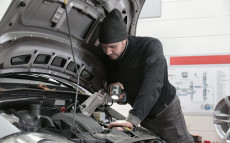- pathfindersAI
- Job Profile
Motorcycle Mechanics
Summary
Motorcycle Mechanics: A Pathway to a High-Octane Career
What They Do
Motorcycle Mechanics are the specialists who breathe life into two-wheeled machines, ensuring they run efficiently and safely. They conduct routine maintenance, troubleshoot issues, and perform repairs on a variety of motorcycles. Whether it's a sleek sport bike, a robust cruiser, or a versatile scooter, Motorcycle Mechanics possess the knowledge and skills to keep these vehicles in top-notch condition. Their expertise spans from mechanical components to electrical systems, making them indispensable in the realm of motorcycling.
Job Responsibilities
Motorcycle Mechanics take on a diverse array of responsibilities. Daily tasks may include diagnosing mechanical and electrical problems using specialized tools and diagnostic equipment. They perform engine overhauls, replace worn-out parts, and conduct regular maintenance such as oil changes, brake adjustments, and tire replacements. These mechanics also understand the intricacies of motorcycle electrical systems, allowing them to repair or replace faulty wiring and components. Beyond the hands-on technical work, Motorcycle Mechanics may also engage with customers to explain repairs, provide cost estimates, and offer maintenance advice. Their role is pivotal in ensuring the safety, performance, and longevity of motorcycles.
Essential Skills
A successful Motorcycle Mechanic must possess a blend of technical prowess and interpersonal skills. Mechanical aptitude is paramount, as is the ability to use diagnostic tools and interpret technical manuals. Strong problem-solving skills enable mechanics to efficiently identify and resolve issues. Attention to detail and manual dexterity are crucial for performing precise repairs and adjustments. Moreover, excellent communication skills are essential for interacting with clients and explaining complex mechanical concepts in understandable terms. Time management and organizational skills ensure that repairs are completed efficiently and workshop operations run smoothly.
Educational Pathways
Aspiring Motorcycle Mechanics can embark on their career through various educational pathways. Many enter the field by completing a specialized motorcycle maintenance and repair program offered at technical schools or community colleges. These programs typically cover engine repair, electrical systems, frame alignment, and brake systems, combining classroom instruction with hands-on training. Additionally, some mechanics may choose to pursue certifications from professional organizations, such as the Motorcycle Mechanics Institute (MMI), which can enhance their employability and demonstrate their expertise. Apprenticeships offer another valuable route, allowing individuals to gain practical experience under the mentorship of experienced mechanics while earning an income.
Career Prospects
The career prospects for Motorcycle Mechanics are promising, particularly as the popularity of motorcycles and scooters continues to grow. Opportunities abound in various settings, including motorcycle repair shops, dealerships, and specialty bike shops. Some mechanics may find employment with racing teams or as instructors in educational institutions. With experience and additional training, mechanics can advance to supervisory or managerial positions, or even start their own repair businesses. The ever-evolving nature of motorcycle technology also presents opportunities for continuous learning and specialization, enhancing long-term career growth and job satisfaction.
Conclusion
In conclusion, a career as a Motorcycle Mechanic offers a dynamic and fulfilling pathway for those passionate about motorcycles and mechanical systems. The role involves a blend of technical expertise, problem-solving skills, and customer interaction, ensuring a varied and engaging work environment. With multiple educational pathways leading to a wide range of career opportunities, individuals can tailor their journey to match their interests and goals. As the demand for skilled Motorcycle Mechanics grows, so too does the potential for a rewarding and secure career in this high-octane field.
Video
Compensation
| State | Median Salary | Median Hourly | Positions |
|---|---|---|---|
| AL | 38,090 | 18.31 | 210 |
| AK | 37,580 | 18.07 | 120 |
| AZ | 47,810 | 22.99 | 650 |
| AR | 44,720 | 21.50 | 250 |
| CA | 50,600 | 24.33 | 1,630 |
| CO | 48,250 | 23.20 | 410 |
| CT | 44,850 | 21.56 | 140 |
| FL | 46,800 | 22.50 | 790 |
| GA | 38,830 | 18.67 | 240 |
| ID | 43,300 | 20.82 | 130 |
| IL | 48,080 | 23.12 | 240 |
| IN | 44,710 | 21.49 | 510 |
| IA | 42,560 | 20.46 | 390 |
| KS | 39,340 | 18.91 | 160 |
| KY | 43,570 | 20.95 | 150 |
| LA | 45,480 | 21.87 | 70 |
| ME | 47,130 | 22.66 | 120 |
| MD | 49,180 | 23.64 | 40 |
| MA | 50,920 | 24.48 | 140 |
| MI | 47,070 | 22.63 | 390 |
| MN | 48,120 | 23.13 | 280 |
| MS | 29,500 | 14.18 | 220 |
| MO | 36,010 | 17.31 | 160 |
| MT | 40,150 | 19.30 | 260 |
| NE | 46,280 | 22.25 | 60 |
| NV | 48,460 | 23.30 | 150 |
| NH | 48,220 | 23.19 | 170 |
| NJ | 47,750 | 22.96 | 180 |
| NM | 28,240 | 13.58 | 60 |
| NY | 47,950 | 23.05 | 520 |
| NC | 41,280 | 19.85 | 450 |
| ND | 48,730 | 23.43 | 110 |
| OH | 43,710 | 21.02 | 310 |
| OK | 39,420 | 18.95 | 280 |
| OR | 49,290 | 23.70 | 230 |
| PA | 44,560 | 21.42 | 650 |
| SC | 40,920 | 19.67 | 160 |
| SD | 43,680 | 21.00 | 190 |
| TN | 43,740 | 21.03 | 260 |
| TX | 39,780 | 19.13 | 830 |
| UT | 49,920 | 24.00 | 270 |
| VT | 46,120 | 22.18 | 90 |
| VA | 48,220 | 23.18 | 440 |
| WA | 45,560 | 21.91 | 470 |
| WV | 36,580 | 17.59 | 120 |
| WI | 49,590 | 23.84 | 450 |
| WY | 48,530 | 23.33 | 90 |
Similar Occupations
In this area you will find other occupations that are close to the one you were viewing in tasks, knowledge and work environment. If the primary job profile you are viewing isn't quite to your liking, take a look around and see what else is available.
Basic and Premium Accounts have more alternative occupations available than the Free account.

Automotive Service Technicians and Mechanics - 49-3023.00
Automotive Service Technicians and Mechanics diagnose, maintain, and repair vehicles by inspecting and working on various components such as engines, brakes, transmissions, and electronics. They ensure automobiles are safe and efficient by conducting routine maintenance, performing complex repairs, and using specialized tools and diagnostic equipment.
-
$47,770/yr
Median Pay -
676,570
Number of Jobs

Bicycle Repairers - 49-3091.00
Bicycle Repairers maintain, adjust, and repair bicycles to ensure they operate smoothly and safely. They diagnose mechanical issues, replace worn or broken parts, and perform routine maintenance tasks such as lubricating chains and adjusting gears.
-
$38,320/yr
Median Pay -
13,980
Number of Jobs